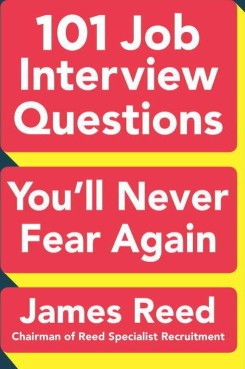| Version 5 (modified by , 8 years ago) (diff) |
|---|
101 Job Interview Questions You'll Never Fear Again ¶
Author: James Reed

Review ¶
Coming Feb 1st week.
Notes ¶
3G Mindset ¶
Global
| Good
| Grit
|
|---|---|---|
|
|
|
Types of Interviewers ¶
- Unicorn Hunter: "The perfect candidate does not exist."
Tactic - Get them to specify competencies required and show how you meet them - Late-running Runaway Train: Disorganized, nervous, ill-prepared.
Tactic - Be effusive & expansive. Talk lots. - Method Man / Woman: Asks all candidates same questions (competency).
Tactics - Point our your relevant ones - twice. - Napolean: Show-off, talks, asks few questions.
Tactic - Offer praise where possible, else silence. - Suitor: Hires attractive people.
Tactic - Move on. - B Player: Likes to hire C players.
Tactic - Highlight your strengths & achievements. You probably won't get hired. - Dues-payer: Defines success in terms of their career path; their path only. Doesn't like career-switchers.
Tactic - Show how your skills are another manifestation of theirs. - RHINO (Really Here in Name Only): Not engaged during interview.
Tactic - Be gracious, put on the best show you can. - Entrepreneur: Founder & sole owner of the company.
Tactic - Play up work ethic, loyalty & flexibility. - Poker Player: A warm & genuine exterior conceals steely interior.
Tactic - Focus on showing what you can do for them. - Goldilocks (Note: I didn't understand this one.): Neither too cold, nor too hot.
Tactic - Pat yourself on the back for bringing out the best in people.
Classic Interview Questions ¶
1. Tell Me About Yourself ¶
Who do you think you are? And will you know what to leave in & what to leave out?
Tactic: Break it down, rehearse, breeze it.
- Show a logical progression or underlying theme.
- Indicate that you know exactly what you're going to say & it won't take long.
- No more than 10% personal stuff.
- What you've been up to lately, how that feeds into your skills & experience, and in turn, how skills & experience feed into this position.
- Close clearly - indicate that you're done. Don't leave it hanging.
- Can bounce around chronologically, but show logical progression.
- Can use current job title to start off with the answer.
- Avoid talking explicitly about strengths & weaknesses - this should flow from results you've achieved. Stick to achievements & passions (I'm not so sure about the passions bit).
2. Why are You Applying? ¶
What can you do that we need you to do? Do you even know what we need you to do?
Tactic: Reflect the job spec in every line of your answer. Talk about their needs before you mention your own.
- I'm applying because my skills, experience and motivation are the best fit for the job.
- Imply long term satisfaction.
- A person's values tend to be stable & enduring - so, point out that your personal values align with the firm's values.
3. What are Your Greatest Strengths? ¶
Do you really know yourself? Do you know what our problem is here?
Tactic: Answer with the job description uppermost in mind. Go easy on the adjectives & heavy on the hard data.
- Map the key requirements of the job against your best achievements to date.
- Mandatory: solve the employer's problems.
Necessary but insufficient: be perceived as smart & professional. - Showcase aspects that show progression & development over time.
- What was the impact of your strength in context? Who acknowledged it and how?
4. What are Your Greatest Weaknesses? ¶
Am I right in thinking X about you? Are you going to give me the same old evasive & lame answers that everybody else did, or are you going to level with me?
Tactic: Interviewer is probably seeking affirmation of predicted weaknesses, not info about new ones.
- Don't give cliched answers; don't trivialize your weaknesses.
- Stick to weaknesses that are apparent, don't introduce a new monster-under-the-bed that the interviewer hasn't spotted.
- Be clear that you know your weaknesses & that they don't perturb you.
- Show evidence that you're working on your weaknesses.
- If possible, directly reference your key performance indicators (KPIs) - make it a less important KPI.
5. What will Your Skills & Ideas Bring to this Company? ¶
What will be buying from you?
Tactic: Appear generous, no one wants a miser.
- Be open & enthusiastic about your ideas, even if they're not a perfect match - your errors will be attributed to your outsider status, insufficient info / context.
- Present ideas in terms of work executed personally.
6. What's Your Preferred Management Style? ¶
Are you and I going to get along?
Tactic: Aim to be the boss & subordinate you always wanted for yourself.
- Show that you can work under your own steam, but also that you know there's a hierarchy.
- Bosses want to provide course correction, not spell out details.
- Show you can take both good & bad news gracefully.
- Show that you can give out bad news with respect & humility.
- Show you can give off good energy to enthuse troops.
- May help to talk about key experiences as a subordinate or manager w.r.t. conflicts, success, goal setting & staff performance.
7. Where do You See Yourself in Five Years' Time? ¶
Are you after this job or just any job? How soon will you need a new challenge? Do you have a realistic sense of what we can offer you?
Tactic: If you don't know, calmly say so, as if now knowing were the most natural thing in the world - because it is.
